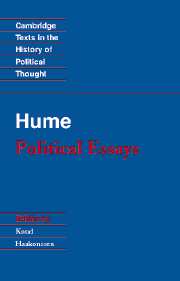Book contents
- Frontmatter
- Contents
- Acknowledgements
- Introduction
- Chronology
- Bibliographical notes
- A note on the text and the edition
- Biographical notes
- Bibliography
- Political Essays
- 1 Of the liberty of the press
- 2 That politics may be reduced to a science
- 3 Of the first principles of government
- 4 Of the origin of government
- 5 Of the independency of Parliament
- 6 Whether the British government inclines more to absolute monarchy, or to a republic
- 7 Of parties in general
- 8 Of the parties of Great Britain
- 9 Of superstition and enthusiasm
- 10 Of civil liberty
- 11 Of the rise and progress of the arts and sciences
- 12 Of national characters
- 13 Of commerce
- 14 Of refinement in the arts
- 15 Of money
- 16 Of interest
- 17 Of the balance of trade
- 18 Of the jealousy of trade
- 19 Of the balance of power
- 20 Of taxes
- 21 Of public credit
- 22 Of some remarkable customs
- 23 Of the original contract
- 24 Of passive obedience
- 25 Of the coalition of parties
- 26 Of the Protestant succession
- 27 Idea of a perfect commonwealth
- Appendix: Excerpts from Hume's History of England
- Notes
- Index
- Title in the Series
14 - Of refinement in the arts
Published online by Cambridge University Press: 05 June 2012
- Frontmatter
- Contents
- Acknowledgements
- Introduction
- Chronology
- Bibliographical notes
- A note on the text and the edition
- Biographical notes
- Bibliography
- Political Essays
- 1 Of the liberty of the press
- 2 That politics may be reduced to a science
- 3 Of the first principles of government
- 4 Of the origin of government
- 5 Of the independency of Parliament
- 6 Whether the British government inclines more to absolute monarchy, or to a republic
- 7 Of parties in general
- 8 Of the parties of Great Britain
- 9 Of superstition and enthusiasm
- 10 Of civil liberty
- 11 Of the rise and progress of the arts and sciences
- 12 Of national characters
- 13 Of commerce
- 14 Of refinement in the arts
- 15 Of money
- 16 Of interest
- 17 Of the balance of trade
- 18 Of the jealousy of trade
- 19 Of the balance of power
- 20 Of taxes
- 21 Of public credit
- 22 Of some remarkable customs
- 23 Of the original contract
- 24 Of passive obedience
- 25 Of the coalition of parties
- 26 Of the Protestant succession
- 27 Idea of a perfect commonwealth
- Appendix: Excerpts from Hume's History of England
- Notes
- Index
- Title in the Series
Summary
Luxury is a word of an uncertain signification, and may be taken in a good as well as in a bad sense. In general, it means great refinement in the gratification of the senses; and any degree of it may be innocent or blameable, according to the age, or country, or condition of the person. The bounds between the virtue and the vice cannot here be exactly fixed, more than in other moral subjects. To imagine, that the gratifying of any sense, or the indulging of any delicacy in meat, drink, or apparel, is of itself a vice, can never enter into a head, that is not disordered by the frenzies of enthusiasm. I have, indeed, heard of a monk abroad, who, because the windows of his cell opened upon a noble prospect, made a covenant with his eyes never to turn that way, or receive so sensual a gratification. And such is the crime of drinking champagne or burgundy, preferably to small beer or porter. These indulgences are only vices, when they are pursued at the expence of some virtue, as liberality or charity; in like manner as they are follies, when for them a man ruins his fortune, and reduces himself to want and beggary. Where they entrench upon no virtue, but leave ample subject whence to provide for friends, family, and every proper object of generosity or compassion, they are entirely innocent, and have in every age been acknowledged such by almost all moralists.
- Type
- Chapter
- Information
- Hume: Political Essays , pp. 105 - 114Publisher: Cambridge University PressPrint publication year: 1994
- 4
- Cited by

